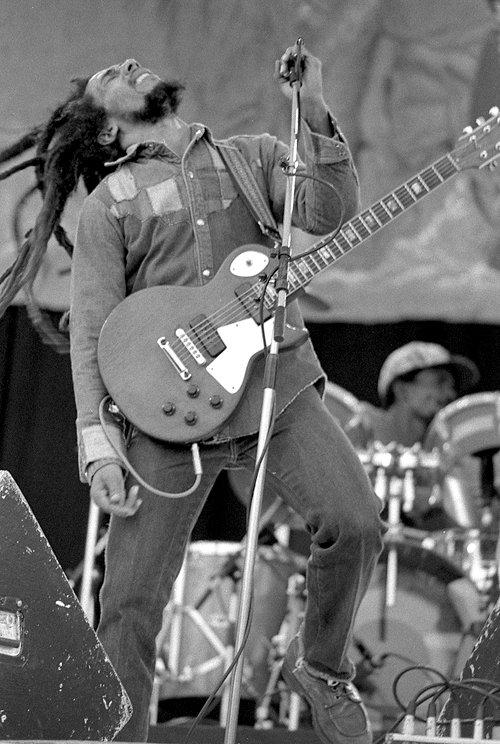
Bob Marley’s music has long been synonymous with messages of resistance, social justice, and unity. Throughout his career, he crafted numerous songs that served as anthems for protest and change, resonating with listeners worldwide. His powerful lyrics and infectious rhythms continue to inspire movements for justice and equality. Here is a selection of 25 notable Bob Marley and The Wailers protest songs presented in chronological order.
Simmer Down (1963)
Backed by The Skatalites, this is the band’s first single, back when they were a ska band. Only 18 at the time, Marley was already socially conscious, composing this response to the rude boys who were getting involved with violent crime.
Small Axe (1970)
Released as a single in 1970, it was rerecorded for the 1973 album Burnin’. It is a powerful statement against oppression, proclaiming that the oppressed will eventually rise. The song not only captures the spirit of the time but also inspires listeners to stand firm in the face of adversity and fight for their rights.
Duppy Conqueror (1971)
Originally from the album Soul Revolution Part II, it was rerecorded for the 1973 album Burnin. The term “duppy” refers to a ghost or spirit in Jamaican folklore, and the song illustrates Marley’s belief in conquering these metaphorical demons. It serves as an empowering declaration of defiance against hardship.
Slave Driver (1973)
From the album Catch a Fire, this tune features the lyric that gives the album its title. The remainder of the track offers a stark and unflinching exploration of the brutal realities of the slave trade, highlighting its links to issues such as poverty, illiteracy, and economic inequality in today’s world.
Concrete Jungle (1973)
Another track from Catch a Fire, the tune reflects the struggles faced by the oppressed in urban environments. Marley’s vivid storytelling paints a bleak picture of city life, which resonates across borders.
Get Up, Stand Up (1973)
Appearing on The Wailers’ classic album, Burnin’ (their final album before becoming known as Bob Marley & The Wailers), Marley was inspired to write this stirring anti-oppression anthem after witnessing poverty on a trip to Haiti. Bob Marley’s wide appeal allowed his songs of protest to be exported beyond Jamaica. Even if you don’t identify with Marley’s political and religious ideology, the sentiments of an anthem like “Get Up Stand Up” are universal. Throughout the world there are oppressive forces that need to be stood up against.
I Shot the Sheriff (1973)
Another classic protest tune from Burnin’, Marley said of the tune, “I want to say ‘I shot the police’ but the government would have made a fuss so I said ‘I shot the sheriff’ instead.” Similar to Body Count’s Cop Killer, close to two decades later, Marley expressed the frustration many were feeling concerning police brutality and corruption. Part of what made Eric Clapton’s hit cover so dreadful is the irony of the tune’s powerful social message being watered down by a racist white musician.
Burnin’ and Lootin’ (1973)
Another powerful tune from Burnin’, Marley addresses the anger expressed by oppressed individuals. When people experience injustice at the hands of the powerful elite, it is only natural that eventually they will lash out.
Natty Dread (1974)
The title track from his 1974 album reflects the struggles of the poor and marginalized. The term “Natty Dread” refers to individuals who embrace their identity and heritage, often characterized by dreadlocks, symbolizing a connection to their roots. Marley conveys a message of hope and defiance, urging listeners to rise above adversity.
Them Belly Full (But We Hungry) (1974)
This poignant tune from Natty Dread serves as a stark warning about the dangers of letting the impoverished go without food. Marley emphasizes that if the situation of the poor continues to deteriorate, they will eventually unite and rise against the injustices they face. The phrase “a hungry mob is an angry mob” encapsulates the frustration stemming not just from the lack of food but also from the denial of fundamental human rights. The song powerfully highlights issues of classism, and unfortunately, its message remains relevant today.
Revolution (1974)
Another track from Natty Dread, the lyrics are in line with the themes presented in “Get Up, Stand Up.” Marley urges his followers to initiate a revolution and advocate for their rights. He proclaims, “It takes a revolution to make a solution,” emphasizing the necessity of fighting for change.
Rebel Music (3 O’Clock Roadblock) (1974)
Another potent song from Natty Dread, it addressed the curfews and roadblocks that were commonplace in Jamaica, and disproportionately targeted the Afro-Jamaican community instead of the elite white populace. Initially, Marley finds himself having to dispose of his herb, but as the crackdown intensifies, the real act of rebellion extends beyond just marijuana, addressing the broader injustices faced by the majority of Jamaica’s citizens.
Crazy Baldhead (1976)
This track is from the album Rastaman Vibration. Rastafarian dreadlocks serve as a powerful emblem of resistance against Western cultural standards, symbolizing authority and a genuine connection to Rastafarian identity. The song alludes to the KKK and other white supremacist groups, highlighting the stark divide between his beliefs and theirs, as well as the ongoing struggle against racism.
War (1976)
Another tune from Rastaman Vibration, it tackles the issue of global conflict and racial injustice, taking its inspiration from a speech by Ethiopian Emperor Haile Selassie. The song’s powerful lyrics demand peace and equality for all races.
Who the Cap Fit (1976)
This tune from Rastaman Vibration addresses hypocrisy and social inequality, urging listeners to be aware and critical of the systems around them. Marley cleverly suggests that those who are guilty of wrongdoing will recognize themselves in the lyrics, symbolized by the metaphor of a cap that fits.
Rat Race (1976)
Another track from Rastaman Vibration, it delves into the struggles and injustices faced by individuals in a society driven by materialism and competition. Marley critiques the relentless pursuit of success that often leads to moral and spiritual disarray. The phrase “Rasta now work for no CIA” acknowledges resistance against external forces that exploit and manipulate cultures. Overall, “Rat Race” serves as a poignant reminder to seek authenticity and purpose rather than getting lost in the chaotic race of life.
Exodus (1977)
The title track of the 1977 album reflects Marley’s profound connection to themes of freedom, unity, and the struggles for liberation. The lyrics draw inspiration from the biblical exodus, symbolizing a journey toward a promised land where equality and justice prevail.
Crisis (1978)
This tune off the album Kaya reflects the themes of struggle and empowerment that permeate much of his work. The lyrics convey a sense of urgency, urging listeners to confront their circumstances and rise above adversity. The song serves as a call to action, highlighting the importance of resilience and unity in the face of crisis.
Africa Unite (1979)
From the album Survival, the song advocates for Pan-Africanism, calling for African nations to come together and overcome the lingering effects of colonialism. Marley’s heartfelt lyrics emphasize solidarity, encouraging a collective identity and strength among Africans. The rhythmic beat and infectious melody inspire listeners to embrace their heritage and strive for a unified future. Through “Africa Unite,” Marley not only crafted a musical masterpiece but also a rallying cry for freedom and liberation across the continent.
Zimbabwe (1979)
Another stirring track from Survival, it serves as a tribute to the African nation’s fight for independence and self-determination. Marley’s spirited call for liberation continued to inspire solidarity movements.
So Much Trouble In The World (1979)
Yet another tune from Survival, it is a poignant reflection on the social and political struggles faced by humanity. The song highlights themes of despair and resilience in the face of adversity. The song embodies Marley’s enduring message of love, unity, and the fight for a better world.
Coming In From The Cold (1980)
This powerful song is from the album Uprising, Marley’s final album prior to his death. The track reflects themes of resilience and the struggles faced by marginalized individuals. The lyrics convey a sense of hope and redemption, emphasizing the importance of unity and the journey to find peace.
Real Situation (1980)
Another tune from Uprising, it is now more relevant than ever. The song examines the flawed leaders of our world and suggests that the only path to change is to take away their power and begin anew. “Well, it seems like total destruction is the only solution. And there’s no use, no one can stop them now,” Marley sings, emphasizing the notion that our leaders are corrupt and highlighting the urgent need for rebellion and transformation.
Redemption Song (1980)
The concluding track on the last album that Marley released before his death, it is impossible to have a more powerful final statement. Essentially a solo acoustic Bob Marley folk tune, it is one of the most breathtaking songs ever written. The lyrics explore how our thoughts can enslave us and that we need to reject all hateful rhetoric to achieve true freedom.
Buffalo Soldier (1983)
Released on the posthumous album Confrontation, the lyrics discuss the African American soldiers who fought in the Civil War, only to be assigned to combat against Native Americans later on. Marley recognized the injustice of two marginalized groups being pitted against each other and wrote the song to highlight the soldiers’ struggle for survival and the resilience of the Black community.
Also, check out the playlist of 25 Bob Marley & The Wailers protest songs.


